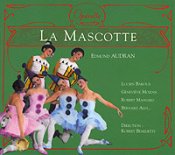The relative disappearance of the genre, also due in part to the rage for Gilbert and Sullivan that began in 1878, is too bad, for as this CD reissue of a 1956 mono recording of Edmond Audran's La mascotte demonstrates, the joys of the genre are many. They may not be to everyone's taste, but they are joys nonetheless. For several reasons, however, this may not be the set to serve as an introduction.
To begin with, because the recording was first made almost 50 years ago, the sound is not what most listeners are used to, and the ear has to make some adjustments. For those of us who grew up with recordings from the 1950s and 1960s, the sound is almost nostalgic; for anyone else, it will more likely prove unsatisfying. The remixing is excellent, as are the performances, but it all - especially the orchestra -- still sounds like it is being performed in a can. The highs border on distortion and the lows are rather shallow, and an overall tinniness is at times inescapable.
Second, the accompanying booklet is in French with no translation provided. Anyone with an intermediate ability in the language (and a dictionary) should be able to negotiate it with little difficulty, although the plot analysis uses a few idiomatic expressions that might give pause. The booklet also does not provide the text for the work, only a plot synopsis, a list of the numbers with titles, characters, and track indicators, and a brief biography of Audran. Understanding the sung and rapidly spoken French is somewhat more challenging than getting through the booklet, and much of the humor will be lost on listeners with only modest skills in the language.
Still, the performance is infectious, possibly indicating why the work is, according to Andrew Lamb, Audran's "most lastingly successful operetta." The plot is simple enough to follow but convoluted enough to provide the necessary opportunities for farce and amusing ensembles. "Une mascotte" refers to a person who serves as a good luck charm, and Bettina, a keeper of turkeys (really), possesses this gift. Rocco, the owner of a small farm, is afflicted with bad luck ("avoir la guigne"), and his brother brings Bettina to him, hoping to make things better. Meanwhile, Pippo, Rocco's shepherd, falls in love with Bettina and Laurent XVII, Prince of Piombino, who is having his own run of bad luck, decides to appropriate Bettina for his own "mascotte." And on it goes, eventually winding up in an Italian inn and also involving Fritellini, the Prince of Pisa, and many others. It is all very silly, very spirited, and very French. And very tuneful.
Among the numbers, one is perhaps somewhat better known than the rest. The duet for Bettina and Pippo, "J'aime bien mes dindons" ("I like my turkeys"), seems to have become especially popular, perhaps because of the barnyard noises made by Bettina to intensify her point. But the vaudeville finales are all delightful, that for the first act utilizing bells to demonstrate the ringing indicated by the title "on sonne" ("it rings"). Like its Gilbert and Sullivan counterpart, the French operetta also favored the patter, or character, song for a mature comedian, and this work has several wonderful examples. Most are performed by Lucien Baroux, who sounds as if he was the French equivalent of Martyn Green. His first act couplets are particularly amusing, appropriating as they do the old gag of another singer providing the high notes at the end of a verse. (The second time, Baroux provides his own, which are even funnier than the substitution gag.) The music for Bettina is full of charm and occasional coloratura, and Genvieve Moizan performs it with confidant charm. Her high notes are exemplary, especially considering the quality of the recording, and it's not hard to imagine her a delightful Olympia in Les contes d'Hoffman. (She also does a nice turkey impersonation.) Full of waltzes, character songs, and sparkling ensembles, the score is a wonderful potpourri of styles representative of the genre, and it is performed with great elan by the cast, all of whom seem to be specialists.
This recording is one in a series of French operettas reissued by Accord. (They are listed on the CD box.) If it is representative of the collection, they are all wonderful performances recorded in what now seems substandard sound quality. If listeners are already familiar with the genre and have a good working knowledge of French, the series will be a treasure despite the sound. If a listener doesn't know the genre and doesn't understand or read French, the joys may remain a mystery.
In short, highly recommended, but probably not for everyone.
Jim Lovensheimer, Ph.D.
Blair School of Music, Vanderbilt University
